BORN IN TIBET, AGAIN: THE EXILE OF THE 12TH TRUNGPA TULKUby Charles Carreon
February, 2005
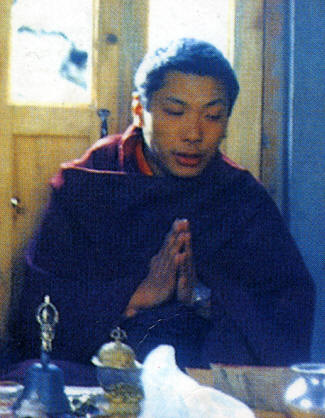 Trungpa XI
Trungpa XI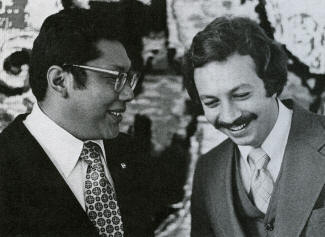 Trungpa XI and Regent Osel Tendzin
Trungpa XI and Regent Osel Tendzin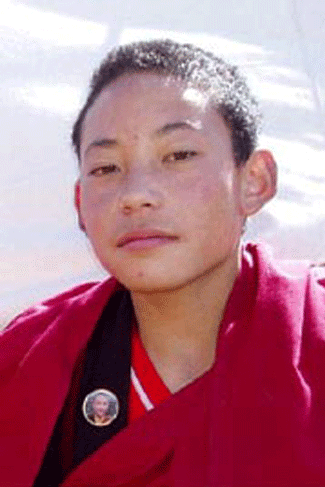 The Twelfth TrungpaTrungpa XI, The First American Lama
The Twelfth TrungpaTrungpa XI, The First American LamaChogyam Trungpa, the 11th Tulku of the Trungpa line, was the most influential Buddhist teacher in the United States for over twenty years, and long after his death in 1987. During his lifetime, he commanded a loyal cadre of students with top social and money connections who insulated him against criminal and ethical charges with a skill that Michael Jackson might envy, and gave negative events a positive spin that would put Karl Rove to shame. He lectured endlessly, if often drunkenly, and his wordsmith-students crafted these lectures into books that were revered as spiritual classics: “Cutting Through Spiritual Materialism,” and “The Myth of Freedom.” After Trungpa’s death, these students promised to put out 108 volumes of his teachings, to be called “The Dharma Ocean Series,” but the series pooped out after a half-dozen titles failed to sell well, and I picked up most of them at markdown prices at a remaindering outlet in Salem, Oregon. That seems emblematic of Trungpa’s stock in the spiritual marketplace, which as this article shows, is now so devalued by his own heirs that they have deliberately severed most of the obvious associations with his tradition, and effectively exiled the person who is supposedly the current incarnation of the great guru to a lonely hamlet in Tibet.
The teacher of Alan Ginsberg and other leading literary lights, such as Sam Bercholz, founder of Shambhala Publishing, the spiritual publishing powerhouse, Trungpa XI entered a spiritual America where teachers were virtually all Hindu swamis, and ate their lunch. Today, Tibetan Buddhism is the only way to fly for the showbiz and literary elements, and while a few Zen outfits still try to sell the bald look, and Vipashyana does steady business with librarians and other quiet types,
the Dalai Lama is the 800 pound gorilla. Tellingly, in
The Guru, Marisa Tomei pouts in the bathroom that her cheap society mom isn’t willing to spring for “a real Tibetan Rinpoche” to provide the spiritual entertainment for her New Age birthday party.

Trungpa’s biography, Born In Tibet, put him on the map as the escaped scion of Tibetan spiritual aristocrats. He moved to England, and obviously not short on cash, got into Oxford, where he behaved like the local lords, and wrecked his car while crocked by piling it into a joke shop. He married an Englishwoman with a title named Diana who now goes by the name Lady Diana Mukpo, who brought him two sons from a prior marriage — a couple of foul-mouthed kids named Gesar and Ashoka who have been recognized as Rinpoches even though they have not a lick of religious training. But those kids have only tarnished Trungpa XI's legacy. His eldest son, originally named Osel, then named Mipham, then “the Sakyong,” has entirely usurped his father's throne, and placed the ancient Trungpa Lineage under his own authority. The purpose of this article is to explain how this happened, citing legal and ecclesiastical documents as evidence, and to point the finger of accusation at those who have made a mockery of their own traditions in the pursuit of wealth and spiritual authority.
Trungpa XI was the focus of controversy at his first western center, Samye Ling in Scotland, and the more-traditional Akon Tulku usurped his authority in a typical Tibetan ecclesiastical coup, even stealing Trungpa’s official seals, and prompting the iconoclastic young lama to decamp for the United States in the early seventies. He landed on his feet on the East Coast of the nation, founding the Tail of the Tiger (Karme Choling) retreat center in Vermont, and soon the stories began.
This was no robe-wearing, wise old man with an inscrutable look that could be an ad for herbal tea. He was a rock and roll lama who quickly figured out that the smartest people in the United States were a bunch of acid-taking, birth-control users with degrees in literature and political science and religious history, who were just beginning to realize that worshiping a fat fourteen-year old Indian kid wasn’t very cool, and yoga was for housewives who didn’t want to do Jane Fonda. He saw Warhol, heard Lou Reed, wrote poetry with Ginsberg, conquered
Richard Alpert aka Ram Dass, and got jerked and sucked off like Jimi Hendrix, but probably was less fun for his groupies — there’s a big difference in size between Tibetans and Africans.
Trungpa was a Buddhist impresario who made kingly treatment of Tibetan Lamas the standard, teaching his students to prostrate themselves body and mind, getting junkies, poets, real estate executives and ingénues to roll out the red carpet for the Sixteenth Karmapa and his entourage. He brought to these puritanical shores the powerful blend of regal pomp, supernatural power, and tantric transformation that is Tibetan Buddhism. Everyone today knows that the Dalai Lama does a “Kalachakra Tantra” ceremony all over the world, ostensibly for “world peace,” but it takes a Buddhist old-timer to remember when the Karmapa performed the “Black Hat Ceremony” that celebrates the assassination of the last anti-Buddhist Tibetan king by a yogi. The first ceremonies were undoubtedly done in high school auditoriums, public halls, and buildings renovated by fervent devotees, but by the end of his life, Trungpa saw his countrymen selling out stadiums like spiritual rock stars. He built the road that the Dalai Lama now walks on.
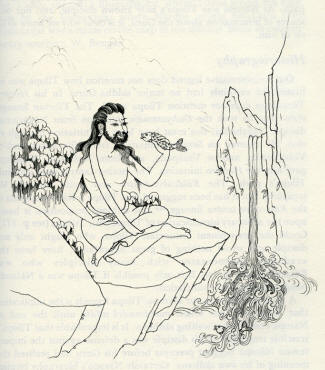 Tilopa
Tilopa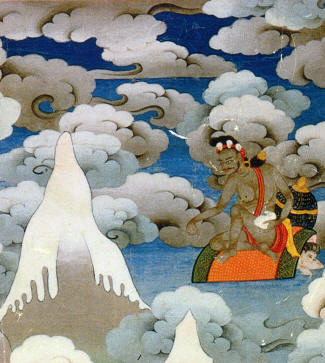 Naropa
Naropa Marpa
Marpa MilarepaTrungpa XI, Holder of the Karma Kagyu Lineage
MilarepaTrungpa XI, Holder of the Karma Kagyu LineageLineage was Trungpa XI’s strong suit – he had ten lifetimes of his own behind him, and the illustrious lineage of Tilopa, Naropa, Marpa, Milarepa, and Gampopa to back that up. This lineage was his inevitable starting point, and with a small bow to his Nyingma teachers, he remained Kagyu through and through to the end of his days. This was clear from the beginning, when he appended to Born In Tibet a bureaucratic document entitled “The Administration of the Ka-Gyu Monasteries of East Tibet.” (Reproduced below at the end of this article.)
In 1976, Trungpa XI put out a large-format book entitled “Garuda IV, The Foundations of Mindfulness,” with a pumpkin-colored soft cover bearing the red Vajradhatu seal of the Garuda holding a shield emblazoned with the knot of eternity. The first work in the book was Trungpa’s own “Supplication To The Gurus of the Lineage,” which begins:
“Great Vajradhara, Telo, Naro and Marpa,
Mila, the lord of the dharma Gampopa;
The knower of the three times,
The omniscient Karmapa;
The holders of the lineage of the four great and the eight lesser schools;
Dri, Tak, Tsel, these three, Sri Drugpa and so on;
And those who have completely achieved the profound path of mahamudra;
To those incomparable protectors of all beings the Dagpo Kagyu –
I supplicate you, the Kagyu Gurus,
I follow your tradition and example;
Please grant your blessing.”

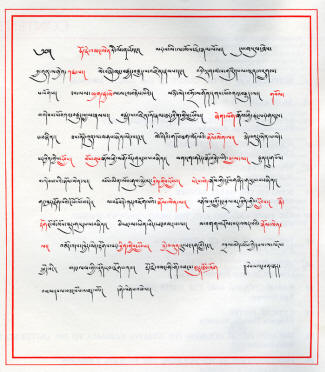
Trungpa XI also published written confirmation of his enlightenment from the 16th Karmapa to teach, embellished with flourishes in red ink. The Karmapa’s words are adulatory, proving that he endorsed and embraced Trungpa XI as a highly honored wisdom-holder of the Karma Kagyu lineage who had turned the western lands into a field of bounty for the Dharma. Entitled a “Proclamation to All Those Who Dwell Under the Sun Upholding the Tradition of the Spiritual and Temporal Orders,” it avers that “The ancient and renowned lineages of the Trungpas … has in every generation given rise to great beings [and] has magnificently carried out the vajra-holder’s discipline in the land of America...”
_small.jpg)
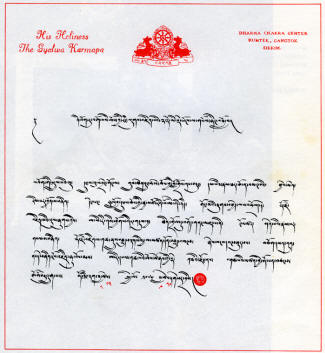 The Burial of A Legacy
The Burial of A LegacyNevertheless, today, Trungpa XI’s legacy has been buried by his own son and heir, “the Sakyong,” who operates not under his father’s Karma Kagyu tradition, but under a Nyingmapa title, and at the behest of Dilgo Khentse Rinpoche, the Kagyu-Nyingma crossover lama. He has also had wisdom and status bestowed on him by Pednor Rinpoche, who recognized
Steven Seagal and
Catherine Burroughs as reincaranated lamas. The organization that bore Trungpa’s name, Vajradhatu, has been replaced by the Shambhala organization, which is run by the Sakyong, and presumably has all the assets of Vajradhatu, since it has all of its students and ritual possessions. The official story of how this came to be is short, and omits all mention of the manner in which the expected succession of the Trungpa lineage was interrupted and altered in its natural course by the conscious intervention of those who stood to profit from decapitating the lineage and exiling its current leader to the frozen wastes of Tibet.
Here’s the expurgated version, from the Shambhala website:Several years later, the Vajra Regent passed away as well. During the period following these deaths, the community and its leadership turned to one of Chögyam Trungpa's most revered and only living teachers, Dilgo Khyentse Rinpoche, then supreme head of the Nyingma lineage. In 1990, at the urging of Khyentse Rinpoche, Trungpa Rinpoche's eldest son, the Sakyong Ösel Rangdröl Mukpo (now known as Sakyong Mipham Rinpoche, as indicated below) returned from a period of practice and study with Dilgo Khyentse in Nepal to lead the community and direct the work his father, Chögyam Trungpa, had begun.
Rarely has impatience to do good work reaped such a reward, and rarely has lama clairvoyance so clearly failed to achieve an important goal. For there was no need to have the Sakyong take the reins in 1990. The 12th Trungpa tulku had been born in 1989, but no lama knew it until 1991, when Tai Situ Rinpoche discovered the new incarnation. Tai Situ is very good at discovering reborn tulkus, although
his choice of a Karmapa did not receive universal acclaim, resulting in violent altercations, even murder. But there was no dispute over his convenient discovery of the 12th Trungpa tulku in the backwoods of Derge. Thus, had the Sakyong but waited a year, the 12th Trungpa Rinpoche would have been both born and discovered, and the crisis averted. Even if the Sakyong had felt it incumbent upon him to assume the reins of leadership, still a due respect for his father’s lineage as a high Karma Kagyu tulku should have caused him to limit himself to perform a regent role until the Twelfth Trungpa Tulku could take the throne.
The Best Laid Plans of Tulkus and MenWhen Trungpa XI died in Vermont in April 1987, everyone expected the Regent to hold his position until what was expected to be a relatively swift rebirth and reassumption of the Trungpa throne. During the interregnum between the death of Trungpa XI and the birth of Trungpa XII, the “Regent” would hold power and occupy the position of head of Vajradhatu. Trungpa chose his regent badly – a bisexual first known as “Narayana” upon whom he bestowed the nom-de-buddha of “Osel Tendzin.” That Trungpa XI was infatuated with Tendzin is clear, and it may have blinded his judgment, because a review of Trungpa’s poems dedicated to the Regent suggests that by a naïve admiration of the Regent’s rapacity, he stoked the flames of a dangerous madness that destroyed all of their plans. Certainly there were plans.
In his second book of poetry,
First Thought, Best Thought, Trungpa XI dedicated many poems to Tendzin, many overtly sexual and encouraging a cowboy style of governing the sangha. In the Epilogue to a republication of “Born In Tibet” in 1978, Trunpga XI included photographs of himself and the Regent suitable for worship, and laid out his thinking: “My approach to administration and the community in general has been to give more and more responsibility to people but to hold the nerve centre in my control, and I am teaching Osel Tendzin to do likewise.”
In 1977, Trungpa XI published Garuda V, Transcending Hesitation, in the same format as Garuda IV, quoted above. Again this publication was the vehicle for announcing important ecclesiastical news. On page 101 of the book appears the following “PROCLAMATION” concerning the elevation of Osel Tendzin:
“By the power and with the blessings of the three jewels, the glorious and authentic root gurus of the Practicing lineage of Kagyu and the Ancient Lineage of Nyingma, the herukas and dakinis, Dharmapalas and lokapalas, I hereby empower and declare Karma Cho-kyi Dawa Legpai Lodro Osel Tendzin Chogle Namgyel, Thomas F. Rich, as DORJE GYALTSAP, VAJRA REGENT to act on my behalf in propagating buddhadharma and the vision of the three yanas throughout the world, and to implement, as a Director of the First Class, the purpose and intentions of Vajradhatu as well as those of the Nalanda Foundation. Proclaimed and sealed at the seat of Vajradhatu in Boulder, Colorado, in America by Vajracarya the Venerable Karma Ngawang Cho-kyi Gyamtso Kunga Sangpo, Trungpa Tulku XI, this 250th year of the Parinirvana, on the 27th day of the Fire Dragon Year of the 16th Rapjung, August 22, 1976. [signed] Trungpa XI [Trungpa Seal]”
_small.jpg)
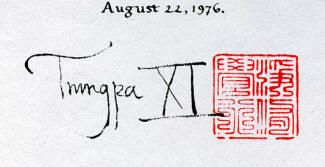
The importance of this document cannot be overemphasized, as it makes absolutely clear that Trungpa XI had decided not to establish a hereditary lineage of succession, which has become so common with other lineages, and flies in the face of the ancient traditions of the Kagyu lineage as a pure meritocracy, based on “practice,” which is to say, achievement. However we may judge in retrospect, this proclamation was Trungpa XI's resounding endorsement of a native-born American citizen, unrelated to him by blood or even nationality, and it was understood as such by the Vajradhatu faithful and the spiritual community at large.
This proclamation was written to serve as an authoritative corporate document. It recites the legal name of the Gyaltsap, Thomas F. Rich, and pointedly names him as the only person authorized to hold Trungpa XI's position as the Director of the First Class in the Vajradhatu corporation. There is no mention of Shambhala International, or of the Sakyong. This document was Trungpa XI's spiritual will, and if there were any doubt of that, the inscription added by H.H. the Sixteenth Karmapa would eliminate it. Appended to the top of the document, with the Karmapa's seal, is the following text: “As set forth below, the supreme Vidyadhara Trungpa Trulku Chogyi Gyatso has appointed his chief disciple, Osel Tendzin, as his Gyaltsap. This I fully acknowledge & rejoice in. Accordingly, let everyone offer to him due respect. Written by the glorious Karmapa, the 8th day of the 12th month of the Fire Dragon Year.” The “Gyaltsap,” according to the Appendix to Born In Tibet, is simply “The Regent Abbot,” second only to the “Trindzin,” who is “The Supreme Abbot.” If Trungpa XI had intended any changes to this document, for example, appointing a new successor, he would have made it absolutely clear, and published the identity of his new Gyaltsap, with equal solemnity and public exposure. No such document exists.
The Regent Flames OutIn the poem entitled
You Might Be Tired of the Seat That You Deserve (For the Vajra Regent at Midsummer's Day), Trungpa XI counseled the new Gyaltsap on the right way to do his job:
Dearly loved comrade,
If you do not hold the seat,
Others may take it away;
If you do not sit on a rock,
It becomes mushy clay;
If you don't have patience to sit on a rock or seat,
They give you away;
If you are not diligent in holding the throne,
Some opportunist will snatch it away;
If you are tired of your seat,
Some interior decorator will rearrange it;
If you don't have a throne,
You cannot speak or proclaim from it,
So the audience will dissipate;
If you don't have a government seat to sit on,
Your wisdom and command seal will be snatched by others;
If you run around, thinking that you have a seat to come back to,
It will be washed away by the turbulent river,
Like a presidential platform;
You can never proclaim your command.
Either it will be disassembled by the cockroaches
Or the frivolous multitude will take it away as souvenirs.
It may be hard to sit on the seat,
But one must endure it.
Do sit on your seat,
Whether it is hard or soft.
Once you sit on your seat,
The sitting itself becomes truly command and message,
Then, undoubtedly, multitudes of people will respect and obey it
As the vajra throne of Bodhgaya where Buddha taught.
Truth becomes exertion.
The message of hard fact proclaims itself,
So you don't have to emphasize harder truth.
Offering your seat in order to please others will not give authentic
reward
They will take the attitude that you are a pleasant seat-offerer.
So, my son, please don't move around;
Assume your seat, and sit, and be.
If you be that way, truth prevails;
Command is heard throughout the land.
So sit and hold your seat.
Then you will enjoy, because others will admire you.
This is hard to do, but easy to accomplish.
Had the Regent performed his job properly, keeping his own nerve centres under control, he would have lived until the 12th Trungpa tulku had been born, identified, and enthroned as the new lineage-holder. But the Regent failed in his mission, dying of AIDS in 1990, leaving his highly literate crew of disciples unusually silent concerning his habit of engaging in unprotected sex with a wide circle of people. The Regent apparently suffered from a bad case of
Tantra-Induced Delusional Syndrome (TIDS), that caused him to believe his toxic emissions would bless his students, not kill them.
Two of the Regent’s blessing-recipients died relatively quickly, a young man who was Tendzin’s lover, and his girlfriend, who didn’t realize that dating a Buddhist could be lethal. Call it the collateral damage from the quest for enlightenment – or one more casualty of Colorado’s notoriously slack prosecution in high-profile homicides. The Regent never saw the inside of a courtroom, despite having committed, before the eyes of witnesses, multiple toxic assaults on the bodies of people who loved and trusted him. But it’s all water under the bridge of innumerable lifetimes, right?
An Enforced ForgettingTrungpa XI could not escape blame for the debacle, because he was renowned for his own philandering, which in posthumous revelations by female students who had serviced him during his lifetime, were revealed to be no more than desultory servicing of his genitals that left the women with little in the way of amorous memories. Trungpa XI was often quoted as saying that the Tibetan Tantric path is not a safe one – that you could “turn into a diamond” if you did it right, or be reduced to “a lump of charcoal” if you did it wrong. With Trungpa XI gone and the Regent having consummated a sexual suicide pact with his closest disciples, the students were left to figure out what was a diamond and what was a charcoal briquette.
The organization, stuffed with intelligent authors who could have discussed the debacle productively, did not rise to the occasion. The Vajradhatu Sun, the house organ of Vajradhatu, boycotted all news of the scandal, resulting in one issue that featured a broken heart on the front page, with no words to accompany it. This was the only protest allowed when the editors killed what would have been a confessional exposé of great importance. The true nature of the rifts that developed in the organization, leading to its current configuration, would be the subject of an interesting book, if anyone had the guts to write it. But with Shambhala the dominant force in Buddhist book publishing, prospective exposé-writers had better plan on publishing their own editions, and forget having any other literary career. June Campbell, for one example, was punished mightily by other Tibetan Buddhists for exposing her lifelong secret affair with Kalu Rinpoche, who like the Dalai Lama, was thought to be completely celibate. Steven Bachelor, for a second example, has been widely criticized for retreating from wholesale endorsement of lamaism.

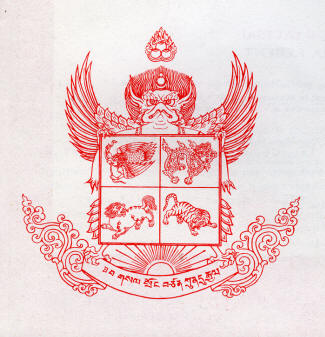 Vajradhatu Becomes Shambhala
Vajradhatu Becomes Shambhala“Vajradhatu” was originally incorporated in Colorado in 1973, as the consolidated entity resulting from the union of Karma Dzong (a Colorado corporation) and Tail of the Tiger (a Vermont corporation). The original Articles of Incorporation for Karma Dzong establish its purposes as “teaching meditation, Tibetan Religious Traditions, Educational handicrafts, and the practice of charity.” Vajradhatu’s revised Articles, filed on February 22, 1973, and signed by Trungpa himself on page 25 of the attached records, state that “this corporation is not formed for pecuniary profit or financial gain, and no portion of its assets, income, or profits shall be distributed to or inure to the benefit of any member, director, or officer of the corporation or any other private individual ….” There are “two classes of Directors” under the Articles, and there’s only One Director in the first class of Directors – Chogyam Trungpa. The Articles don’t spell out what the differing powers of the two classes of directors are, probably because having one man who calls all the shots, officially, kind of conflicts with the notion that “no portion of the assets, income or profits shall … inure to the benefit of any … director … or … individual.” Theocrats have special needs, and lawyers are willing to devise special corporate structures to suit them. But a corporation with an all-important head Director is quite vulnerable to takeover while the head Director is dead. And that is just what happened in the case of Vajradhatu. While Trungpa was between life number eleven and life number twelve, the Sakyong stole his company.
Today, “Vajradhatu” is simply an assumed business name of Shambhala International, sometimes in legal documents written as “Shambhala International (Vajradhatu).” But it was not always so. Any old-timer will tell you that until year 2001, “Vajradhatu” simply meant “the Church” to the Trungpa-faithful, and it was a spiritual trademark of great value.
Shambhala ®Lest you think I am taking irreverent liberties by referring to spiritual trademarks, please note that, twelve years after Trungpa XI’s death, on August 9, 1999 the “Vajradhatu, DBA Shambhala International” applied for a U.S. Trademark on the words “Shambhala Meditation Centers,” in connection with providing the following goods and services: (1) “Buddhist religious practices,” (2) “meditation instruction,” (3) “a series of graduated seminars instructing participants in meditation practices and non-sectarian spiritual training,” and (4) seminars and workshops in field of contemplative arts, music, and theater. Trademark Number 75771345 was issued on June 19, 2001. The company has continued to obtain trademarks on four more Shambhala-related names, most recently obtaining U.S. Trademark Number 78297783 on November 30, 2004 on the term “Shambhala Art.” So sorry if you wanted to use that name for your new Tibetan handicrafts store – the corporate Tibetans got there first. But who are the corporate Tibetans, and why have they buried the Vajradhatu name?
Shambhala Eclipses VajradhatuThere was never any sign that Trungpa XI intended to have Shambhala eclipse Vajradhatu, and in the early years Shambhala was clearly the secondary organization, putting a secular spin on Buddhism through concepts like “fundamental human dignity,” derived from Trungpa’s book,
Shambhala – The Way of the Warrior. It was, in effect, Vajrayana-lite, and never intended to take the place of Vajradhatu. But times change, and when names change with them, you can be sure it’s for a reason.
On the Shambhala website, Vajradhatu is now defined in several amorphous ways, but never as an entity. It is most diaphanously described as a spiritual space: “Vajradhatu (Sanskrit for ”indestructible space“) provides a spiritual journey of training on the Buddhist path following a well-defined, graduated method of practice and study developed by Chögyam Trungpa Rinpoche.” Alternatively, it is one of the “Three Gates of Shambhala”: “The Vajradhatu Gate offers a method of developing compassionate wisdom and skillful action through meditation practice and study in the 2,500-year-old Buddhist tradition.” This is clearly the tail wagging the dog, a classic reversal of roles – when Trungpa XI started teaching Shambhala, it was billed as the “secular” offshoot of Vajrayana Buddhism.
Vajrayana Becomes Co-Equal With Tea CeremonyIn the orthodox Shambhala view, Vajrayana Buddhism has been reduced to the status of a “gate” in the larger architecture of the Shambhala edifice. Further, you might ask what the other two gates are. Well, the first is Shambhala itself (a typical Tibetan overlapping of categories to make the numbers come out right), and the other is some silly invention called “Nalanda,” a mishmash of Japanese cultural activities like archery, flower-arranging and calligraphy that co-opt “zen aesthetics,” providing refuge for disciples who reject the eye-popping color combinations that make traditional Tibetan temples resemble the inside of a Turkish bus.
The Ouster of The Twelfth TrungpaThe deconstruction of Trungpa XI’s legacy might be funny if it weren’t the cover for a gigantic property grab by the Nyingmapas, and the ouster of the rightful heir to the Trungpa throne, at least if reincarnation means anything to you. The manner in which the takeover was achieved is easy to see if you observe seven basic facts that are documented in this essay. First, after Trungpa XI’s death and the Regent’s flameout, the Shambhala name supplanted the Vajradhatu name in official usage. Second, Chogyam Trungpa Mukpo remained on the books as Sole First Class Director, for four years after his death in April 1987. Third, on February 22, 2000, “Restated Articles” of incorporation were signed for Vajradhatu, which: (1) changed the company name to Shambhala International, (2) removed Chogyam Trungpa Mukpo from the official record as the sole Director of the First Class, (3) adopted sweeping liability protections for all directors, and (4) failed to identify the new Sole Director of the First Class. Fourth, the Restated Articles were not filed with the Colorado Secretary of State for twelve months after being signed, having cooled in the hands of a Boulder lawyer for the intervening time period. Fifth, the true identity of the Twelfth Trungpa tulku was known to all when the Restated Articles were signed. Sixth, there is no public record of who is now the Sole Director of the First Class under the new regime. Seventh, it may be presumed that the Sakyong is the Sole First Class Director of Shambhala International.
The Paper CoupAfter Trungpa XI’s death, he remained on the corporate records as the Sole Director of the First Class until February 22, 2000, when Boulder lawyer and longtime Vice President of Vajradhatu, Alexander Halpern, signed a document changing the name of Vajradhatu to Shambhala International, and adopting new Restated Articles of Incorporation. In the past, various other officers had signed corporate documents, but the Restated Articles do not bear the signature of the Sakyong or anyone but Halpern.
The Restated Articles were clearer than the old Articles about the power of the Sole First Class Director, containing provisions that specifically make the “first class of Director” effectively omnipotent by giving him veto power over all the Board’s actions: “All actions of the Board of Directors shall require the consent of the Director of the first class …” This is, effectively, the establishment of a Kingship under the guise of a non-profit corporation. But who is the King under this carefully crafted regime? The documents do not identify the new “Director of the first class.”
Whoever he is, he is as protected from corporate liability as the law can make him. You wouldn’t think a religious organization would adopt a provision in its Articles to insulate its Directors from lawsuits. But with AIDS victims outliving their expected expiration dates, the Regent was still casting a deadly shadow from the grave, and the Shambhala lawyers created this paragraph to protect the nameless new Directors, noting carefully that “this provision will not eliminate the liability of a Director for any act or omission resulting before the effective date of these Restated Articles.”
Without exercising too much clairvoyance, I believe I can see that, in the Restated Articles, the Sakyong sought to distance himself from the errors of Trungpa XI and his embarrassing Regent by changing the company name. He eliminated the Trungpa name from the record documents and elevated himself secretly to the role of sole Director of the first class. He specifically gave himself veto power over the Board. And he immunized himself and his yes-men Directors from damages suits for all types of corporate misconduct, “including a transaction from which [any] director derived an improper personal benefit.” This eighth paragraph provides all Directors with as large an immunizing shield as the law will allow, using self-contradictory and confusing language. I wager this wasn’t due to a sudden lapse in grammatical skill, but rather resulted from Alexander Halpern’s studious efforts to build in “wiggle room” for future debates about how much misconduct is immune from liability. If it ever becomes necessary to judicially interpret it, the Shambhala lawyers will agree with me – the eighth paragraph of the Restated Articles are a Class 1 Bunker for the Top Brass.
A Vulnerable Empire ExposedPlacing such documents in the public record exposes them to broad scrutiny, and the new Shambhala order probably wanted to avoid such scrutiny of these suspiciously self-serving Articles. Additionally, they probably needed time to accomplish other political maneuverings, so Vice-President Halpern sat on this important document for over a year before filing it with the Colorado Secretary of State. Signed on February 26, 2000, the Restated Articles weren’t filed until March 2, 2001. (Compare the first page of the document for the filing date, and the last page, for the signature date.)
March 2, 2001 also witnessed the other side of the mirror-magic of making Vajradhatu disappear as a corporation, while keeping the name in limited play. On that day, Vajradhatu was filed as an Assumed Business Name of Shambhala International, and the figure-ground reversal of these two entities was completed. Since then, the name of Shambhala International (Vajradhatu) appears on a couple of corporate documents. The identity of the Directors is not disclosed, and this is quite significant. Take note that, from April 1987 until February 22, 2000, the sole First Class Director of Vajradhatu was a dead man, Chogyam Trungpa Mukpo. Now that has got to be a precarious situation, when the designated top-dog, the sole First Class Director, is absent from the planet.
The job of the Regent was to fill that gap, and Osel Tendzin certainly acted like the sole First Class Director of Vajradhatu until his death. The Regent’s death left the position open, vacant, a vacuum of the sort that nature hates. If Osel Tendzin hadn’t killed himself, and had been on the job enforcing Trungpa XI’s wishes on February 22, 2000, with the 12th Trungpa already born and identified, they would simply have changed the name of the sole First Class Director to – well to whose name?
Chokyi Sengay, Well-Connected in Derge, Nobody in Boulder, ColoradoWho is the 12th Trungpa Tulku? According to Konchok.org, Lady Diana's family website, he’s a young man named Chokyi Sengay, who surprised the hell out of everyone by being born to a family of shepherds in Derge, who have “ties to the royal family of Derge.” Well, he may be well connected in Derge, but in Boulder, they don’t know him. Alexander Halpern, the corporate lawyer who worked for a company with a dead top Director for four years, doesn’t know Chokyi Sengay. They have never been introduced, but Halpern understands that he lives with herdspeople in Tibet, and doesn’t need immunity from American lawsuits. He has no worries, and Halpern isn’t worried about protecting him from liability. The Sakyong is his client. That stuff about other lifetimes cuts no ice with him. These Tibetans do things their own way. He relates with the man who signs the checks.
If I could, I’d like to ask Chokyi Sengay, Trungpa Rinpoche XII, a few questions:
• How does he like his new body – was it good to get rid of the old, cirrhotic liver?
• When’s he coming to Colorado? Lots of people miss him.
• Which of his close students have gone to visit him? Did he remember any of them?
• Is he learning to speak English?
• Does he plan to go to Oxford on a Spaulding Fellowship, like his last incarnation did?
• Does he know that on the Shambhala.org website, there is no link on the main page announcing that he, the founder of the Lineage, has been discovered?
• Has he seen or read any of the books that he published in his last lifetime?
• Does he know that he was a bit of a rakehell, and embarrassed his elders by acting out with his beatnik flock?
• Does he know that in his last lifetime he arranged his affairs so he would inherit his former status of sole Director of the first class of Vajradhatu, a Colorado nonprofit corporation?
• Has he heard of how his Regent screwed up Trungpa XI's plan to pass his wealth and power on to himself, the Twelfth Trungpa?
• Has he been told about the importance of Alexander Halpern, the Boulder lawyer whom Trungpa XI made Vice-President of Vajradhatu, and who is now Vice-President of Shambhala International?
These are the kinds of questions that a person who had real faith would ask. Lady Diana glosses over the bizarre confiscation of the Trungpa Lineage’s wealth by noting that, “during his lifetime Chogyam Trungpa Rinpoche, the 11th Trungpa Tulku, made many conflicting statements regarding his future births. Accordingly, his rebirth in Tibet was unexpected by many of his students – and has been viewed by some as yet another surprise of the ‘great vajra trickster.’”
Ah, were it only true. What has happened is quite the reverse, and if Chokyi Sengay really sees with the insight of eleven enlightened lifetimes and the recollection of his past deeds, it must all seem a bitter irony. That those he trusted in the last life distorted his legacy into some silly construct called Shambhala, that purports to subordinate Vajrayana Buddhism as one of the “Three Gates” to a cult of secular wholesomeness, on co-equal grounds with flower arranging and the tea ceremony. Truly those who have multiple lives have multiple sorrows.
The Sakyong and the Twelfth Tulku – Best of FriendsJust as the Vajradhatu trademark has been cast into the shadows, the connection with the Karma Kagyu lineage has been downplayed, and thus the importance of the Twelfth Trungpa. In a world governed by the will of Trungpa XI, there would certainly be a biography of the Twelfth Trungpa Tulku somewhere on the Shambhala.org website. You'd expect them to be trumpeting it from a link straight off the front page of its website, somewhere between the links to ”Chogyam Trungpa“ and ”Sakyong Mipham.“ But no, you can strain your eyes, and you won't find anything. I ran a search for ”12th Trungpa + bio“ through the site-specific Google search box at Shambhala.org and found no links. I tried it again over the full Internet, and discovered the official bio quoted below at Konchok.org, the family album website for Lady Diana, Trungpa XI's widow, who also does Shambhala trainings as her livelihood.
There is information about a meeting between the Sakyong and the Twelfth Trungpa in Tibet during July 2004, in a travelogue from a few naive observers who went along on the trip. Notably among the persons present at this trip from among the Shambhala crew was Sangye Khandro, aka Nancy Gustafson, a still-ravishing blonde translator who was married to Gyatrul Rinpoche for about twenty five years before she moved on to the care and training of Lama Chonam, whom Gyatrul Rinpoche had lovingly rescued from inevitable death by tuberculosis. A rare case of a young Tibetan pulling a romantic coup on an older one. In any event, if the Sakyong brings Sangye Khandro along, all problems are solved. She has always been a huge lama favorite, and while a bit chilly, a big favorite with men of all ages and types, for her entire adult life.
The Peculiar Austerity of the Young Tulku’s Current CircumstancesStill, I wonder about how they're treating the Twelfth Tulku — perhaps a bit too much like a mushroom — fed on bullshit and kept in the dark. The travelogue has a disturbing bit of information that smacks of internment. As far as I remember, Trungpa XI always enjoyed fine things, as in sophisticated surroundings. Read
Born In Tibet if you doubt it — the man knew privilege as a life-long condition, and hardship as a passing acquaintance. He lived well and enjoyed it. But in this lifetime, his overseers have decided to host him in conditions that a modern American describes as unbelievably primitive, sunlight deprived, and similar to a televised ordeal from the Survivor reality show:
“By the measure of what we are used to in North America and Europe, the accommodations here are primitive beyond your wildest imagination. It makes camping look like the Hilton, but at the same time the hospitality has been extraordinary. We are pervaded by the warmth, the playfulness and the friendliness of the people. We all feel that we are in luxury, in a certain way — luxury with a medieval ambience. It's like a time capsule. We live in dirt quarters that are pitch dark, not just for us, but for Rinpoche. To get into Rinpoche's quarters, you go over these planks that are bouncing up and down over a kind of a moat. Suffice it to say that ”hole in the wall“ (or the floor) is an apt description of a bathroom. By this point, though, we've all settled in and feel quite welcome. It's wonderful. We're getting along well together, or at least as Rinpoche said the other day, ”’Nobody has been voted off the island ... yet.’" (The Rinpoche referred to here is clearly the Sakyong, because the Twelfth Tulku doesn’t watch TV.)
Which other major Tibetan Buddhist organization has installed the current incarnation of their beloved guru in a hole in the wall, or floor, living in darkness, with mud and planks for a home? Which other Vajrayana group is using the dead image of the last incarnation of the lineage, instead of the living, youthful image of its current tulku? The fact that there are two Karmapas doesn't keep their adherents from keeping them in pleasant conditions and posting pictures and news about both of them all over their websites. Recently, Tai Situ’s 17th Karmapa moved out of Tibet, and the news was hailed internationally. Only the Twelfth Trungpa Tulku is regarded with indifference and housed in squalor.
Not only are the vast media resources of Shambhala International boycotting the very existence of the Twelfth Trungpa – the young boy is so poor that Lady Diana is passing the hat for him at the Konchok.org website – trying to raise a measly $10,000 for his yearly support, promising that anything over that will be used to fix up his impoverished surroundings. Ten thousand bucks? The Sakyong’s SUV cost six times that much, if he has a Toyota Landcruiser, like every other top lama. In any event, Shambhala International is a money machine, but its leaders have reduced to penury the very person they claim to believe is the reincarnation of the founder of their own organization. Most people would treat the reincarnation of their dog better. Here’s the confession right on the website at
http://www.konchok.org/trungpa.html:
“Trungpa Rinpoche’s support and education at Surmang costs approximately US$10,000 per year, which the Konchok Foundation is committed to providing. If funds received for his support exceed that, they will go towards the much-needed upgrading of his living quarters.”
The Sakyong’s Usurpation of the Entire Trungpa LineageThe fact that the young tulku lives in abject poverty and is studiously ignored would seem to be enough. But the outrage does not stop there. Not only has Trungpa XI's entire plan been aborted, not only has the hallowed Trungpa Lineage been subordinated to the corporate manipulations of the Sakyong, an upstart who has hijacked an ancient lineage, turning it into an American marketing machine – a worse abasement has been committed, and in plain sight of the faithful, apparently too stupid or too confused to understand. Read on in horror if you dare, as we watch the final reversal of fortune played out in a ceremony that Sangye Khandro justly described as “the kind that would be done only under extremely rare circumstances.” No kidding – for anyone from the old school, this is a gross inversion of the way things are supposed to be.
The following is quoted from the Shambhala.org website, obviously recorded by fools who have no understanding of the depth of the outrage in which they fawningly participated:
June 18: Surmang
This is the second installment of a dispatch received on June 18 from Peter Volz and Derek Koleeny of the Office of International Affairs and Kusung Dapön Mark Thorpe.
Atmosphere & Interactions
Sakyong Mipham Rinpoche has been very, very busy from morning to night. People are coming in and asking for blessings in a steady stream. The monastery is actually quite a busy place. It reminds one of the fact that Trungpa Rinpoche said in Born in Tibet that he had to move to Dorje Khyung Dzong, a couple of hundred yards up the valley — and at 1500 feet higher elevation straight up — to escape the busyness of the monastery.
The throne ceremony held on Saturday the 16th was really quite magnificent and significant. According to Sangye Khandro (translator who is part of the Shambhala traveling party), it was a kind of ceremony that would be done only under extremely rare circumstances. At the height of the ceremony, the Trungpa Tulkü and all of the Surmang lamas each made offerings to the Sakyong. Then, they made a specific request and supplication to the Sakyong. Having requested him to remain in this world to continue to benefit beings, they requested that Sakyong Mipham Rinpoche be the throne holder, lineage holder, and the leader of the Surmang monasteries. In the days following, they have already begun to discuss various issues with the Sakyong concerning the present activities and the future of the monasteries.
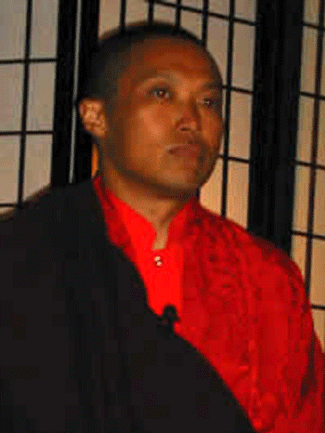 The Usurper of the Trungpa Lineage — Sakyong Mipham
The Usurper of the Trungpa Lineage — Sakyong Mipham
Sangye Khandro, as the handmaiden of this miscarriage of justice, and all of the other people who have pulled the wool over the eyes of the Twelfth Tulku have, of course, done us all a big favor. Clearly they do not believe a word of this reincarnation stuff.
We are now free to admit that Chokyi Sengay is not a supernatural incarnation, because he would fry them with his little finger and disembowel them as vow breakers, lineage betrayers, usurpers, conspirators. He is just another Tibetan boy with a brain and good looks, connected with the Derge royal family, conscripted to play a role written by wizened old men. But eventually, if he suffers no accidents, he will meet some old students, other than Sangye Khandro, who know the truth and will tell him. It will seem a bitter irony then for him, and the moreso because he will have no ability to disbelieve in his own identity as the Twelfth Trungpa, and no means to wrest from the Sakyong the empire that should have been his. I’ll have a book to recommend for him at that time –
The Count of Monte Cristo. He might find it a clearer guide than the sutras and tantras they’re trying to stuff his head with now, softening it up so he will accept the inevitable – the Eleventh Trungpa was the last.
Trungpa XI had the instincts and the skills of a Chakravartin, a Universal Lord. It was his clear intention to plant his Vajradhatu flag in the soil of America, and to rule under that banner forever from his Rocky Mountain home. He failed at the outset, but that may not be his fault. Death has a way of taking matters out of our hands, and treachery always finds willing tools where there's a fortune to be made. In this case, the villains have left their prints all over the crime scene, but they will never be brought to justice, any more than Osel Tendzin was. It’s all just that Tibetan stuff, anyway.
_______________
Appendix 1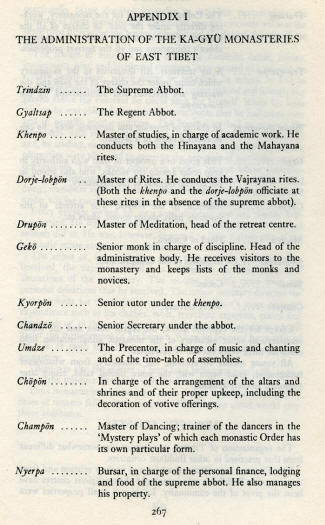
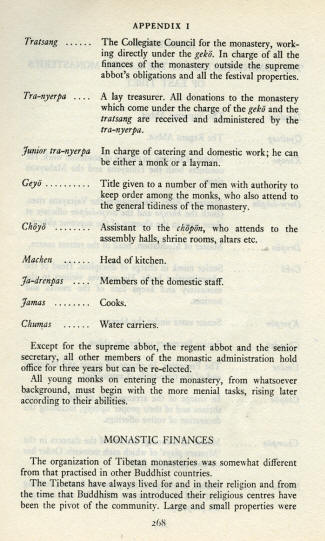
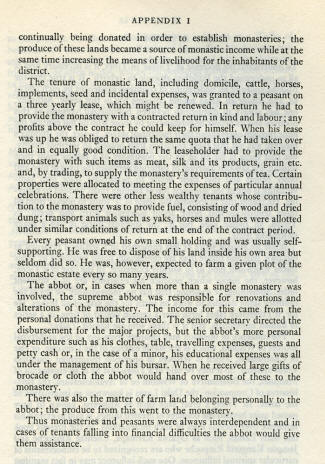 From Born in Tibet, Appendix I -- The Administration of the Ka-Gyu Monasteries of East Tibet
From Born in Tibet, Appendix I -- The Administration of the Ka-Gyu Monasteries of East Tibet
(Now the property of Sakyong Mipham, Nyingma lama)

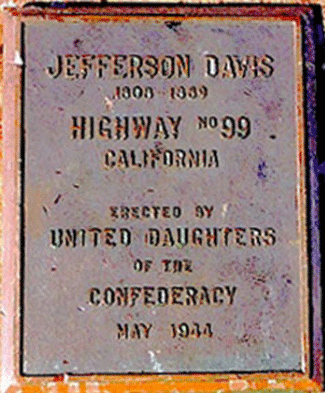
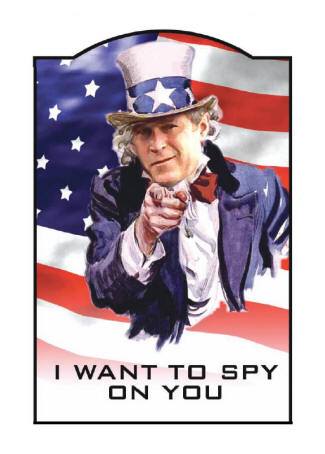











_small.jpg)

_small.jpg)






